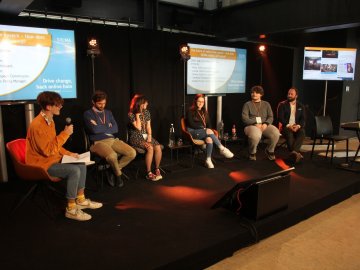Promoting tolerance and empathy online is an ambitious endeavor, which calls for a concerted effort among various stakeholders. How does the industry play its part? Jacqueline Beauchere, Chief Online Safety Officer at Microsoft and member of the SELMA Education Task Force against online hate speech, shares her view on the topic.
"At Microsoft, we believe in treating each other with respect and dignity in real life and online. As we kick off the fourth year of our campaign for ‘digital civility,' we call on people around the world to embrace their roles in fostering safer, more empathetic and inclusive online interactions.
"To do so, Microsoft launched the Digital Civility Challenge, which covers four ideals for life online:
- Live the golden rule – Act with empathy, compassion and kindness in every interaction, and treat everyone online with dignity and respect.
- Respect differences – Appreciate cultural differences and honor diverse perspectives. In case of disagreement, engage thoughtfully and avoid name calling and personal attacks.
- Pause before replying – Pause and think before responding to things you disagree with. Do not post or send anything that could hurt someone else, damage someone's reputation, or threaten your safety or the safety of others.
- Stand up for yourself and others – Tell someone if you feel unsafe, offer support to those who are targets of online abuse or cruelty, report activity that threatens anyone's safety, and preserve evidence of inappropriate or unsafe behavior.
"As part of our overall Digital Civility efforts, we released baseline research in 14 countries two years ago, having polled teens and adults about their exposure to 17 internet risks. The study expanded in the second and third years, growing in both the number of geographies surveyed and the range of risks included. This year we will poll the same demographics in 25 countries about 21 online risks – including online hate speech. Our research surfaces unique findings with each instalment, but none so clear as our most recent results, which highlight the vital roles that young people, parents and other adults play in protecting individuals and families online.
Teenagers look for adults' support for their experiences online
"In 2017, we asked respondents which groups or organizations they deemed the most responsible and the most trusted for protecting individuals and families online. Across the 22 countries, parents ranked the highest as the most responsible and the most trusted. National governments ranked second overall, scoring an above-average trust reading, but were deemed less responsible for individuals' overall online well-being. A year later, the research yielded another significant finding: now more than ever, teens across the globe are turning to their parents and other adults for help with online issues. In year three, 42 percent of teens who had experienced an online risk said they asked a parent for help, while 28 percent sought guidance from another trusted adult like a teacher, coach or counselor. In the prior year, those percentages stood at just 10 percent and 9 percent, respectively.
"The messages to these groups are clear: parents and adults need to familiarize themselves with what teens and young people are doing online; they should be open to conversations with youth, listen and suspend judgment and, if some follow-on actions are needed, adults and teens should agree on those plans together. Meanwhile, young people should seek help from grown-ups – research shows their friends and classmates are doing the same; they should trust in adults' wisdom and advice and, if actions need to be taken, they should make a plan together.
Promoting tolerance and empathy on the internet – a multi-stakeholder effort
"In turn, governments can certainly play a role in equipping parents, educators and other trusted adults with the knowledge and resources they need to assist teens and young people in managing online risks. Key topics for awareness-raising campaigns might include the importance of being proactive about adopting safer online habits and practices, as well as the criticality of reporting illegal, abusive and potentially harmful content and conduct to technology companies and even local authorities in some instances. Governments can also ensure digital citizenship and social and emotional learning are taught in schools from the earliest of ages – very much in line with the educational approach that SELMA is advocating. Additionally, governments can strengthen laws to deter conduct like online exploitation and harassment, and create and grow public-private partnerships for the benefit of all.
"Technology companies have a responsibility to create purposeful online environments, inform users of permitted and prohibited conduct on their platforms and services, and offer seamless and effective mechanisms for reporting violations while also allowing for redress. They should help to inform the public about the ever-evolving risks that people may face online and what individuals can do to best protect themselves and their families.
"As a global online community, we should work together to encourage and grow a culture of online civility that respects and values different opinions, makes room for all perspectives, breaks down echo-chambers and sparks fresh insights. We need to embrace free expression, tolerance, and cultural and social diversity. We should share knowledge and help to build and support safe and trusted online environments where individuals are encouraged and empowered to share, create, learn, debate, disagree and fully participate.
"Microsoft's Online Safety website and Online Safety resources page offer guidance for handling almost any online safety situation. For more regular news and information, connect with us on Facebook and Twitter, and pledge to take our Digital Civility Challenge here."
By Jacqueline Beauchere (Member of the SELMA Education Task Force against online hate speech)
The views and opinions expressed in this article are those of the author and do not necessarily reflect the views of the European Commission or organisations or parties associated with the project.
The SELMA Toolkit will be released on this website in May 2019. Meanwhile, we invite you to join the movement to promote tolerance and empathy online – be sure to keep an eye on our Twitter #SELMA_eu hashtag, while following us on Facebook.






